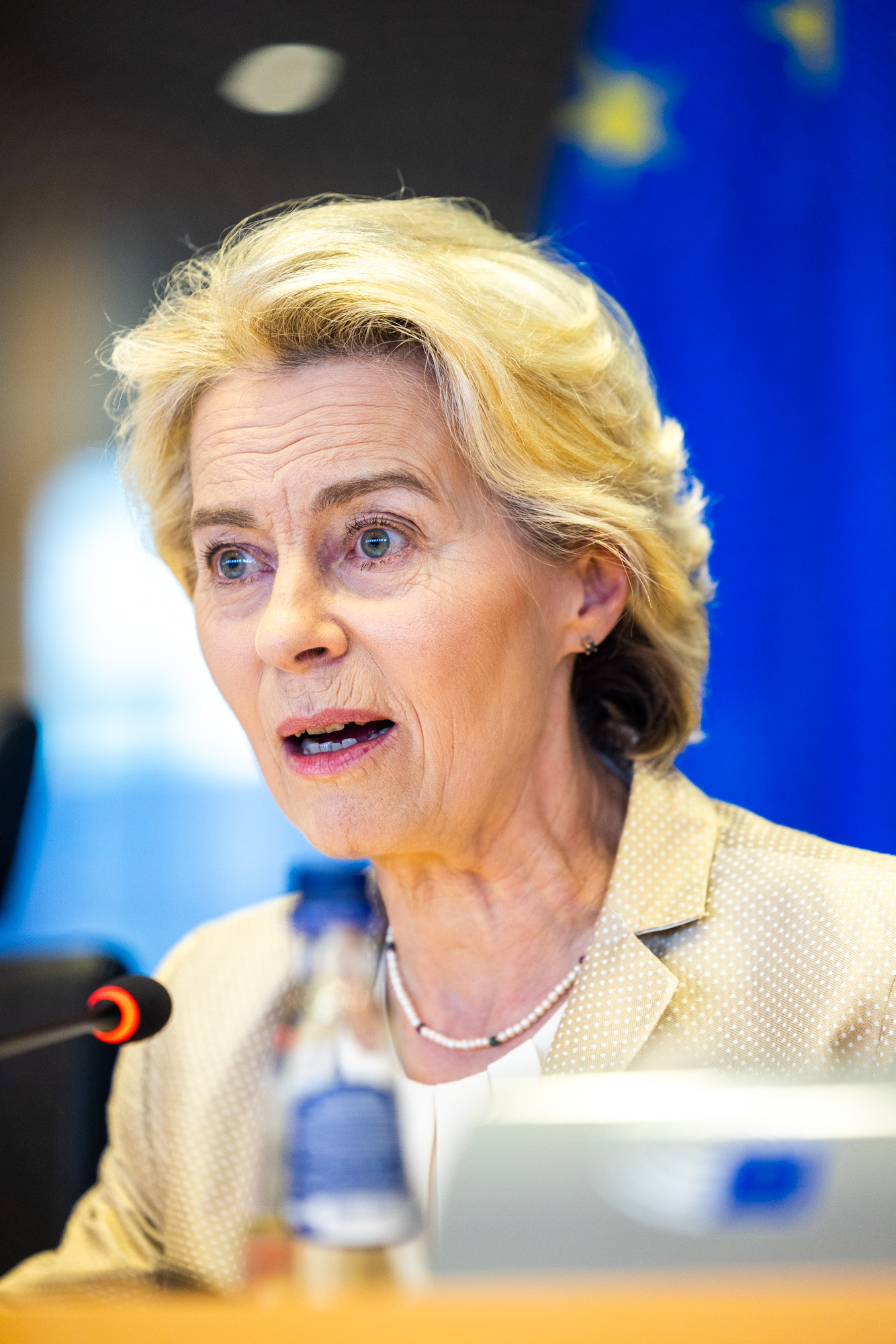The Impact World this Week: 25 July 2024
Your quick guide to the most interesting news snippets about social enterprise, impact investment and mission-driven business around the world from the Pioneers Post team. This week: Von der Leyen snubs the social economy, Darren Walker to leave the Ford Foundation, Havas agencies lose their B Corp status, and more.
 EU: Ursula von der Leyen has been re-elected as president of the EU Commission, but the social economy doesn't appear to be among her priorities. Her address to parliament emphasised her commitment to the EU’s Green Deal and the need for a just transition, with much reference to clean tech and innovation – but at no point did she mention the social economy, nor impact investing and its potential to unlock private capital for good. The EU has a strong history of supporting the impact sector, notably through the Social Economy Action Plan, but it looks like it won’t be on the president’s agenda for the next five years – it might be up to individual commissioners to carry on the work, like Nicolas Schmit did in the previous parliament.
EU: Ursula von der Leyen has been re-elected as president of the EU Commission, but the social economy doesn't appear to be among her priorities. Her address to parliament emphasised her commitment to the EU’s Green Deal and the need for a just transition, with much reference to clean tech and innovation – but at no point did she mention the social economy, nor impact investing and its potential to unlock private capital for good. The EU has a strong history of supporting the impact sector, notably through the Social Economy Action Plan, but it looks like it won’t be on the president’s agenda for the next five years – it might be up to individual commissioners to carry on the work, like Nicolas Schmit did in the previous parliament.
- Read more about the EU Social Economy Action Plan
Global: Advertising giant Havas has seen four of its agencies stripped of their B Corp status, over the group’s work with oil company Shell, OnImpact reports. The decision was made after a complaint from more than 30 communication agencies led B Lab, the non-profit that oversees B Corp accreditations, to undertake a formal investigation. It found “a breach of the B Corp community’s core values” which Havas failed to address, B Lab stated.
Bangladesh: Microfinance pioneer and Nobel Prize laureate Muhammad Yunus urged the international community to take action to end violence in his country of Bangladesh, where student protests over the past two weeks have been met by brutal police repression, causing the death of 100 people. Yunus, himself at risk of imprisonment over a corruption case that his supporters say is politically motivated, said: “I urgently call on world leaders and the United Nations to do everything within their powers to end the violence against those who are exercising their rights to protest. There must be investigations into the killings that have taken place already… I urge people of goodwill around the world to add their voices to my call for world leaders and the United Nations to end this unnecessary carnage so that we can all get back to the work of building the self-reliant, democratic, and peaceful Bangladesh of our dreams.” Read the full statement.
- Read our Pioneer Interview with Muhammad Yunus: ‘Education gives us a passenger mentality – but we are the pilots of this planet’
Africa: The six winners of the 2024 Africa Impact Investment Awards have been revealed in Nairobi, Kenya, as part of the annual Africa Impact Summit. The awards, run by financial consultancy firm Krutham, aim to “celebrate outstanding contributions to the burgeoning impact investment sector across the African continent”. Among the winners, eBee Africa, which provides affordable and sustainable electric mobility solutions to improve access to clean transportation in underserved communities, grabbed the Social Enterprise of the Year award; Phatisa Fund Manager was recognised as Impact Funder of the Year for its work deploying and mobilising capital across the continent; and Villgro Africa received accolades for Financial Structure of the Year, for its innovative financial structures supporting early-stage social enterprises.
Ireland: The Irish government has published its policy on social enterprise for the next five years. Among the government’s goals are to raise awareness and help the growth of the sector, support the green transition and develop social impact measurement. It is the second time the government publishes a social enterprise policy, and Heather Humphreys, minister for Rural and Community Development, called the policy “an ambitious step forward in the government’s ongoing commitment to social enterprise.”
Global: Impact measurement initiatives have received a million-dollar boost from the Tipping Point Fund on Impact Investing. Eight organisations working on impact measurement, data and metrics have received grants totalling US$1.14m from the multi-donor fund, dedicated to supporting the growth and fidelity of the impact investing market. Among the recipients are the International Foundation for Valuing Impacts for its work on impact-weighted accounts; Capitals Coalition for the development of a governance framework to ensure transparency and confidence of the valuation of impacts; and the Aspen Network of Development Entrepreneurs, which is working on guidance and case studies to help small and growing businesses to deal with ESG reporting regulations.
Scotland: A community-led distillery has secured a £140,000 funding package to revive a remote area through whisky-making. Cabrach Distillery received the blended finance investment from Social Investment Scotland ahead of opening this summer. The social enterprise will be the central asset of the Cabrach Trust, aiming to re-develop the small rural community, located in Moray, which has suffered considerable population loss like much of the Scottish Highlands. The trust hopes the distillery will create jobs and re-invigorate the traditionally whisky-making area.
Movers and Shakers
- Darren Walker, CEO of the Ford Foundation since 2013, has announced he will step down from his role at the end of 2025. Among many achievements as the head of the organisation, he led the foundation’s first foray into impact investing with its US$1bn Mission Investments programme.
- Catalyst 2030 has named its two new co-chief facilitators, Gaby Arenas de Meneses and Fredrik Galtung, who have both been involved with the movement since its inception. They will replace Jeroo Billimoria, one of the initiators of the Catalyst 2030 project. Read our Pioneer Interview with Billimoria.
- The Trussell Trust has appointed Natalie Campbell MBE, co-CEO of Belu Water and chancellor of the University of Westminster, as its new chair of trustees. Read about Campbell’s and other impact leaders’ advice on how social innovators and media professionals can work together to put the spotlight on social enterprise.
- Upaya Social Ventures has appointed AB Chakravarthy, its current India country director, and Shruti Goel, director of impact and partnerships, as the company’s new co-CEOs. Chakravarthy and Goek will be stepping into their new role on 1 August, following on from Kate Cochran, who has been CEO for nine years.
- The Resource Alliance has appointed Ingrid Srinath, activist and founder of the Centre for Social Impact and Philanthropy at Ashoka University, as its new board chair. Srinath succeeds Bill Toliver, who has been chair for six years.
In case you missed it
Global: Current progress falls far short of what’s required to meet the UN Sustainable Development Goals, according to the UN’s latest report on the topic published last month. With just six years remaining to achieve the 17 goals – adopted by all UN member states in 2015 with the ambition of creating a fair and sustainable world by 2030 – governments and the private sector need to “take massive investment and scaled up action” if they are to meet the goals, according to the paper. To date, only 17% of the SDG targets are on track, nearly half are showing minimal or moderate progress, and more than one third have stalled or even regressed, the research finds. Critical areas including climate change, peace and security, inequalities among and between countries are currently undermining SDG progress, according to the report.
Japan: Impact investments in Japan have reached JPY11.5tn (US$72bn) in 2023 – jumping 197% from the year before, according to the latest report published by GSG Impact’s national partner in the country, now available in English. That’s a huge leap from 2021 when impact investments in the country were worth just JPY1.3tn. The increase follows a series of policy initiatives at government level to nurture the sector, including a draft of official guidelines on impact investing, and the launch of the “Impact Investment Initiative for Global Health” at the G7 Hiroshima Summit last year.
Global: 90% of the world's 2,000 most influential companies are not even halfway to meeting fundamental societal expectations on human rights, decent work and ethical conduct, according to the first Social Benchmark, published on 2 July by the World Benchmarking Alliance. Companies in the “SDG2000” generate revenue equivalent to 45% of global GDP and employ 95m people. Yet, according to the report, efforts to respect human rights are only evident among the top 10% of companies that surpass the halfway mark. Namit Agarwal, social transformation lead at the World Benchmarking Alliance, said: “The SDG2000 companies have resources and influence equivalent to some of the biggest countries, impacting more people than the populations of many nations. Regulation, guidance, and external pressure are necessary to steer businesses in the right direction.” .
Image: Ursula von der Leyen in Brussels on 9 July. Copyright European Union 2024; source: EC Audiovisual Service.



